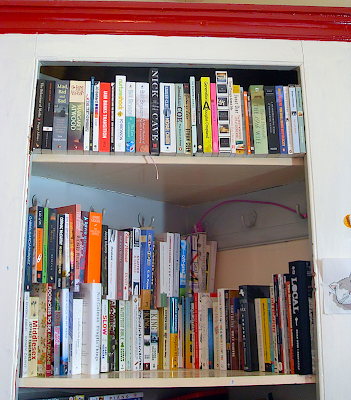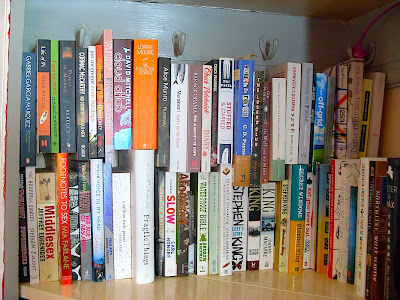I bought this book at the same time as Heroes and Villains, for the subject matter. But then when I found out that I had been offered a place at Oneworld, I decided to move it to the top of the list so I can get a little more of a feel for what they’re publishing at the moment.
I’m very interested in self-sufficiency and permaculture, and I have read several other books which I’ve really enjoyed on the subject, including Free by Katherine Hibbert, How to be Idle (and Free) by Tom Hodgkinson and Off-Grid by Nick Rosen (and I also have his UK book, How to Live Off-Grid). Unsurprisingly, I’m not actually personally that off-griddy. Yet. But I’m interested in it, and in particular reading about other people’s experiences of it.
A little off topic for a bit: I am bothered by modern life. As much of a consumer as I am (I’m not the worst, but definitely not the best either), it bothers me. There are three things that bother me the most:
The first one is living space, or the dilemma of renting/buying a place to live. I am constantly astounded by the cost of simply having a roof to put over your head, before you’ve even taken into account any other living costs, like council tax and being connected to the National Grid. If you live in a town, you have to share that space with plenty of other people, maybe in a house share, or maybe you don’t earn enough to live in a safe part of town and get scared walking to and from your house every day (true story). That such a high proportion of the money I earn should go on a roof over my head is preposterous. I don’t have a solution for this problem.
The second thing is working. I have no problem with hard work, but it seems to me that so many of my choices are for things that just don't matter. Job to uphold structures which are fanciful, at best, and delusional, at worst (like banking). It has taken me all this time to figure out that what I really wanted to do was something involving books. I have always loved books, and they matter to me. But there's a part of me that doesn't see the merit in the trade-off implicit in getting money for your time spent working. Then, when you have that money, you pay other people to do the tasks that you don't have time for, like buying food instead of preparing and growing it yourself. Or paying the National Grid to heat your house instead of chopping down wood for your own fire.
The third thing is food. Food is so expensive. So pre-packaged. So sprayed with all kinds of shit and grown/killed in dreadful conditions. What’s more, the amount of food that we waste in the West that is still perfectly good to eat is disgraceful. The solution here is to grow your own food and support local farmers etc. But this is hard, too. This is effort. And in my hypothetical life with a job, I don’t have time to do this because I’m working 40 hours a week to pay for my shitty, unsafe house, and commuting 3 hours per day to my job.
ANYWAY.
I can certainly see the appeal of opting out of this system, and creating a new system for yourself, so I am always delighted to read about someone else’s experiences of doing so, as it gives me hope that one day I'll be able to find a way of living that is somewhat off-menu.
Mark outlines his plan to spend a year with no money – earning no money, having no bank account, accepting no money. Everything will be done through foraging and nature, bartering, and making use of what he already has. He begins his year just as Winter is about to get brutal in the UK, and tries to source everything that he needs from local sources and relying on members of the community exchange skills with him.
At the beginning of his quest he sets out some pretty strict rules for himself, which I don’t always agree with (there is one incident where he’s cold whilst waiting for a boat and refuses to go into a heated room). There are a couple of sad moments where his project seemed to get in the way of him living his life fully, like missing out on a friend’s stag do because he has no money, but refusing to let others pay for him. But I guess he was learning his own rules at the time, and he should certainly be commended for being able to laugh at himself, too. (Although maybe a couple too many poo jokes).
Of course, things don’t always go smoothly, but Mark has a keen sense of adventure and has a lot of faith in the power of human interaction (probably more than I do). I was also pleased to see his approach was a ‘living off the land’ kind of deal, very different to Katherine Hibbert who ends up living in abandoned spaces for a year. I’m much more attracted to Mark’s way of doing things, partly because I don’t like the idea of the instability that comes with squatting, and I also don’t really feel comfortable in big cities where most squatting happens. I like his appreciation for nature, and the way he makes his caravan his home. Squatting seems too precarious to me. I also do have an attachment to things. I might want to live with fewer things, but that doesn’t mean I’d enjoy coming home to find all my things thrown out by the landlord of the property I’m squatting in. A nice little caravan of my own would be fine.
The other problem I have with squatting and skipping for food, is that you end up relying more on what other people are wasting than creating something of your own. Obviously, I’d rather that empty buildings and extra food went to good use, but my personal preference would be to live more in the way that Mark sets out.
All in all, very enjoyable. I’d like to learn more, so will probably end up visiting his Freeconomy project online at some point. I’m not sure if I’ll ever end up taking the leap into a more self-sufficient lifestyle. I’d like to, but I’m not quite sure where to start. My only criticism of the book is that at 200 pages, it's very short to cover what Mark gets up to in a year, and feels a little rushed in places.
Next time: since I'm clearly unable to stick to my guns this week, my next book will either be The Unit by Ninni Holmqvist, or almost definitely, The Eyes of the Dragon, by Stephen King.











